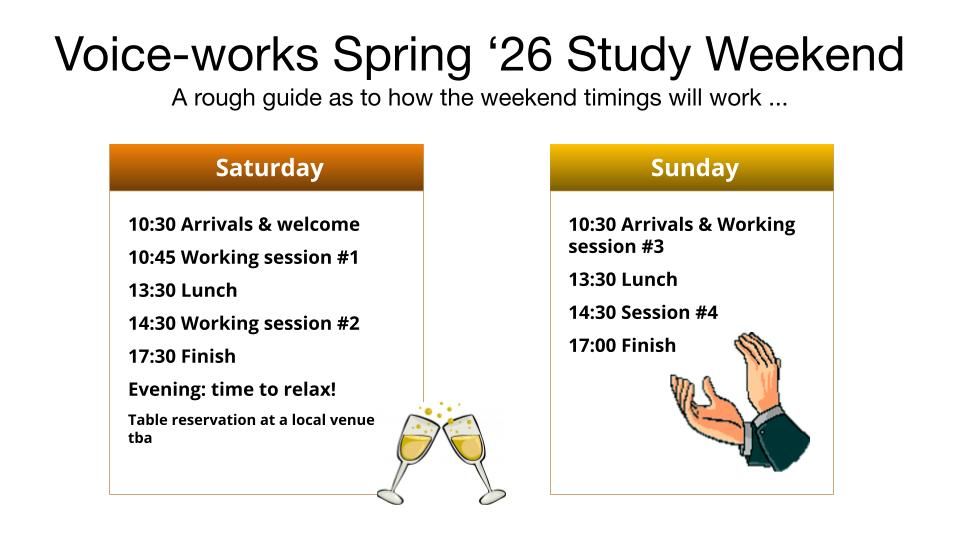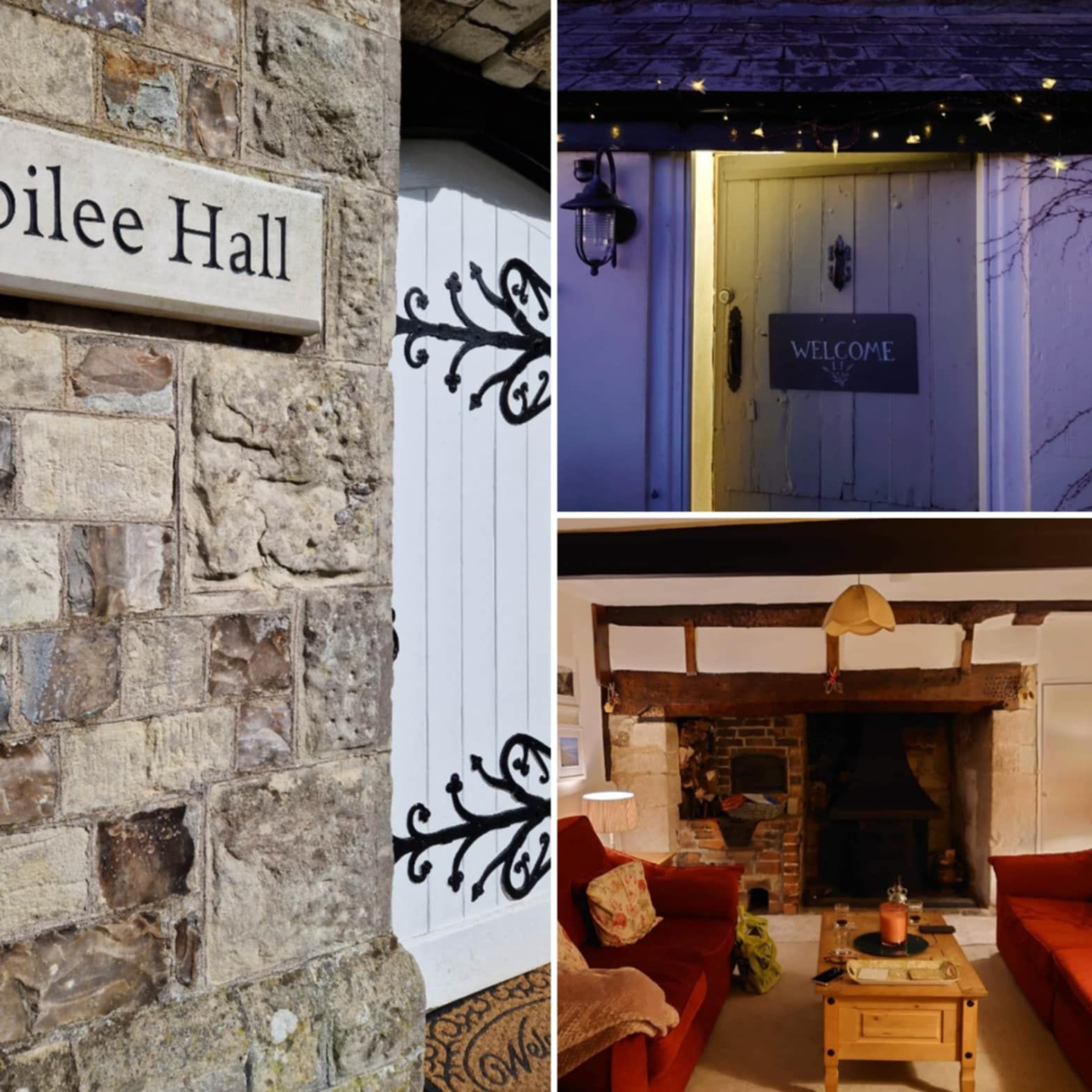
VoiceWorks Study Weekend: Eight American Greats
17–18 January 2026 – Winsham, Somerset, UK.
A two-day exploration of American art song in all its forms — lyrical, gritty, expansive, elegant. Studying within a small group with space to work deeply and attentively on repertoire you choose. Singer application closes Friday 21 November 2025
Why This Repertoire? Why This Era?
We’ll be spending time with eight American composers whose songs offer real rewards for classical singers. Not just because they’re enjoyable to sing (though they are), but because they open up musical, historical, and vocal questions that are worth exploring — especially if you’re looking to deepen your technique and broaden your understanding of what’s out there.
These composers weren’t chosen at random. We looked carefully at who’s had the greatest influence — who’s written the most substantial, lasting repertoire for singers working in the classical tradition. Each one earned their place on this list. Some names you’ll already know. Others might be new — but they all belong in the room.
We’ll be covering a wide stretch of time — more than a century — and what’s interesting is how these composers, for all their differences, seem to share something: a distinctly American way of writing for the voice. It’s not easy to define, but you can hear it in the rhythm, in the treatment of text, and in the musical shapes they reach for. It’s a voice that grew out of a particular time and place, and shaped the development of song as we now know it.
This isn’t just about repertoire for repertoire’s sake. It’s about finding music that helps you grow. Whether you’re working on phrasing, resonance, language, flexibility, or simply finding a new angle on your sound, this era has plenty to offer.
And yes, at long last, the women get a look in. Florence Price is waiting in the wings, and she’s not alone. These composers aren’t included as a token gesture. Their work stands up. It sings.
These weekends are about joining the dots — between eras, between composers, between what you’re singing and what you’re learning. This is another piece of that wider jigsaw. I’m excited to see what you’ll uncover.
Who’s in the Lineup?
Here are the eight composers we’ll be focusing on across the weekend. They span more than a century of American musical life, and each one offers something distinctive — in style, in language, and in what their songs ask of the singer.
Amy Beach
A prodigious talent and the first American woman to gain serious recognition as a composer of large-scale classical works. Her songs are elegant, expressive, and firmly rooted in the European Romantic tradition — but with a freshness that’s all her own.
George Gershwin
Bridging the worlds of classical, jazz, and popular music, Gershwin brought rhythmic vitality and natural lyricism into the classical sphere. His songs sparkle with character and often invite the singer to play with style and phrasing.
Kurt Weill
A German-born composer who made America his home, Weill brought a sharp theatrical instinct to his American songs. There’s grit, drama, and political edge here — as well as opportunities for real vocal clarity and text work.
Aaron Copland
Often called the voice of American classical music, Copland captured a sense of openness and spaciousness in his writing. His songs are direct, earthy, and sometimes deceptively simple — with plenty of room for nuance.
Samuel Barber
Barber’s songs are a gift to singers: richly lyrical, beautifully set, and emotionally resonant. He brought a refined sense of vocal line to American music, always attentive to the natural rhythm and shape of the text.
Leonard Bernstein
A true polymath — conductor, composer, pianist, educator — Bernstein’s songs are vibrant, witty, and full of personality. He drew freely from jazz, theatre, and classical sources, demanding both agility and presence from the singer.
Carlisle Floyd
Best known for his operas, Floyd’s vocal music is steeped in Southern storytelling. His songs have dramatic weight and emotional bite, with a clear connection to language and character.
Ned Rorem
One of the most prolific American song composers, Rorem wrote with charm, intelligence, and a deep understanding of the voice. His work often feels personal — reflective, thoughtful, and grounded in poetic text.
What you'll be preparing
You’re invited to bring up to four songs, each by a different composer from the main lineup. Think about contrast when you’re choosing: this is your chance to explore a range of styles, moods, and vocal demands — not all slow, not all jazzy, not all minor key. The idea is to stretch your repertoire thinking and to build something you can carry forward beyond the weekend.
Waiting in the wings...
There are a few composers who didn’t make the main list during research, but are very much part of the bigger picture. Florence Price, Stephen Foster, and Charles Ives are all there in the wings — ready to be called upon if something in their writing truly speaks to you.
Consider them your wild cards: if one of their songs feels like an essential part of your next step as a singer, you’re welcome to swap one in.

What to Expect
This is a Voice-works Study Weekend, so there’s no need to have your music fully polished, but you will need to know it well enough to work on. The focus is on getting into the detail: discovery, what the repertoire can teach you about your voice, your technique, your choices, and inform your next steps.
It’s a supportive, generous space, no big-group pressure, just thoughtful work in good company - with like-minded souls. Study weekends bring together a mix of historical context, vocal technique, camaraderie, and space to think artistically. Everyone brings something different to the table, and that mix always leads to a rich, inspiring experience.
Because we’re working in a small group (maximum five singers), you’ll get plenty of focused time on your own repertoire — and I always make sure there’s time for everything you’ve prepared.
We’ll spend the first day tucked in at Church Farmhouse, where it’s warm and familiar — a gentler way to begin after Friday evening travel. Then on Sunday, we’ll move into the Jubilee Hall just up the road, a beautifully acoustical space for gathering everything together and making sense of what’s emerged. I’ll shape the rhythm and the content of both days to suit the spaces and the people in the room — always with your learning, comfort, and voice in mind.
The Weekend at a Glance ...

Ready to join me?
How to Take Part / Sign Up
Singers
All places are now taken, but you can still come and take an active part as a valued observer!
Singer applications are limited to a maximum of 5 to keep the working group focused and connected.
Observers
Observers are very welcome to join us in the Jubilee Hall, on Sunday 18th January. You’ll not simply be ‘watching’, your presence matters. Also, if you’re not ready to sing this time, you can still take part in the learning by attending as an engaged observer.
Observer Day passes are available at £20 per day.
Still thinking about it?
If you’d like to keep in touch to receive updates about this and other Voice School events, you’re very welcome to join my mailing list by completing the form to the right. I send updates carefully and thoughtfully, always with singers like you in mind.
Stay in touch
See you inside The Green Room
Once you’ve signed up for the Study Weekend, I’ll be in touch personally to gather your thoughts and share all the logistical details. This will be a day (or weekend!) where we collaborate closely to create an experience that truly serves us as singers — positive, supportive, and focused on your growth.
To help keep us connected before, you’ll have access to The Green Room, our private online space where you can ask questions, share ideas, and get encouragement from me and the other singers. (Currently, this is hosted on Facebook, but I’m always looking for ways to make this space as welcoming and easy to use as possible.)
I’ll be with you every step of the way.
"It's essential to work on something you're deeply interested in. Interest will drive you to work harder than mere diligence ever could. The three most powerful motives are curiosity, delight, and the desire to do something impressive. Sometimes they converge, and that combination is the most powerful of all."
Source: How to Do Great Work



